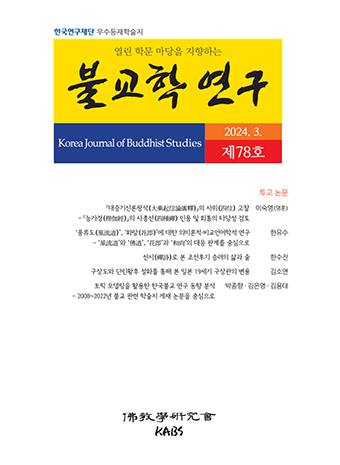Abstract
References
Sorry, not available.
Click the PDF button.
Information
The purpose of this dissertation is to investigate the role perception of Han Yong-un (1879~1944) in Modern Korean Buddhism. The study of the his thought has proceeded from the standpoint of nationalism, so that he is well-known as a poet, campaigner, philosopher of enlightenment or revolutionist. But we has forgotten for a long time that he was a bonze. In this study, I state that he was worried about how make certain social role perception in Korean Chan Buddhism. His effort to solve the problem was achieved by connection between Linji Chan and Caodong Chan. he disentangled a characteristic of the Korean Linji Chan, so to speak transcendentalism and non-historicity, by means of introduction of Caodong Chan. Here, it seems that his circumstantial judgement was worked at that time. Han Yong-un's understanding of the Linji Chan is not conventional, as he name it 'Chanless Chan'(禪外禪). It is different from the existing Korean Chan tradition, because a role consciousness work in his idea. In this point, he is different form a general campaigner or revolutionist. Where is the interface between the Chan consciousness and role consciousness? This was the most urgent problem to modern Korean buddhist. And they presented that interface with each one's viewpoint and insight.
Click the PDF button.
- Publisher :Korean Association of Buddhist Studies
- Publisher(Ko) :불교학연구회
- Journal Title :Korea Journal of Buddhist Studies
- Journal Title(Ko) :불교학연구
- Volume : 16
- No :0
- Pages :109~135


 Korea Journal of Buddhist Studies
Korea Journal of Buddhist Studies






